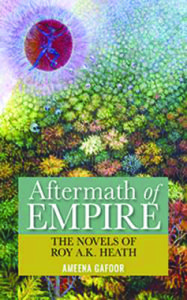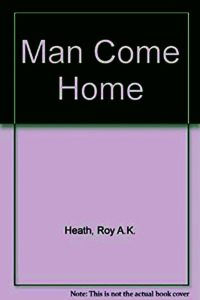 With the publication of her singular book, Aftermath of Empire: The Novels of A. K. Heath, Ameena Gafoor has sort of brought Roy Heath back home to his birthplace to be re-discovered, to be reappraised and to be re-appreciated, in a way rescuing him from self-imposed exile and also rescuing his work from obscurity (limited critical response) because Gafoor in this seminal publication was able to place Heath among the forefront of Guyanese Literature (his oeuvre of nine novels is only surpassed by Edgar Mittelholzer and Wilson Harris) by painstakingly revealing to us how ‘Heath has practically refined the introspective Guyanese antihero’ while finding occasion to ‘celebrate every one of his flawed fictional creatures: their humaneness, their eccentricities, their weaknesses, and their strengths, even if they are social misfits and psychological wrecks’.
With the publication of her singular book, Aftermath of Empire: The Novels of A. K. Heath, Ameena Gafoor has sort of brought Roy Heath back home to his birthplace to be re-discovered, to be reappraised and to be re-appreciated, in a way rescuing him from self-imposed exile and also rescuing his work from obscurity (limited critical response) because Gafoor in this seminal publication was able to place Heath among the forefront of Guyanese Literature (his oeuvre of nine novels is only surpassed by Edgar Mittelholzer and Wilson Harris) by painstakingly revealing to us how ‘Heath has practically refined the introspective Guyanese antihero’ while finding occasion to ‘celebrate every one of his flawed fictional creatures: their humaneness, their eccentricities, their weaknesses, and their strengths, even if they are social misfits and psychological wrecks’.
Numbers (of books published) matter in context but in this instance the quality of content of Heath’s work far outweighs quantity. And it would be shown how his work was influenced and had evolved as he sojourned through life mainly those formative years in urban Guyana.
Gafoor also gives Heath his rightful place in the canon of Caribbean Literature by showing how he has ‘revolutionized the form of the regional novel…[n]o non-Indian writer has displayed such remarkable cultural knowledge and such psychological depth in depicting East Indian experience in the West Indian novel’. Heath’s The Shadow Bride would be essential reading here.
That is saying a lot but who is Roy Heath? Roy A. K. Heath was born in 1926 in Georgetown, the capital city of British Guiana.

His father was a head teacher and his mother a teacher at St. Andrew’s Primary School. Heath’s father was born in St. Kitts and his maternal linage comes from the Dutch possession of St. Marteen and from Barbados. His formative years were replete with house moving. When he was two years of age, his father died, leaving four children: two sisters and an older brother. When Heath was four, the family resettled in Agricola, on the East Bank of Demerara, a few miles from the city. At eight, he was sent to live with an aunt in the heart of Georgetown. The next house move found him in Charlestown where he lived for fifteen years. Heath attended Central High School.
In 1950, he went to England where he was trained as a teacher and a lawyer. He taught French and German in a variety of London secondary schools. He was a member of the Princeton University class and later served as professor of psychology.
Heath’s first novel was published when he was almost fifty years of age. That novel, ‘A Man Come Home’, was published in 1974. He was in his 70s when his last novel, ‘The Ministry of Hope’, was published. Although Heath turned to novel writing late, he was able to produced nine well-written, well-received books in a period of two decades.
Here is a list of Heath’s novels:
A Man Come Home, 1974
The Murderer, 1978
From the Heat of the Day, 1979
One Generation, 1981
Genetha, 1981
Kwaku, 1982
Orealla, 1984
The Shadow Bride, 1988 –winner of the Guyana Prize 1989
The Ministry of Hope, 1997
Heath is better known for his magisterial novel The Shadow Bride followed by
the Georgetown Trilogy consisting of ‘From the Heat of the Day’, ‘One Generation’ and ‘Genetha’; these three books were also published in an omnibus volume, The Armstrong Trilogy, 1994. A lot of attention is now on The Murderer with a hint of making it into a movie.
In 1978, his novel, ‘The Murderer’, won the Guardian Fiction Prize. In 1989, his novel, ‘The Shadow Bride’, won the Guyana Prize for Literature.
Heath has written a number of short stories, some of which were aired on the BBC. The story, ‘Miss Mabel’s Burial’ was aired on the Guyana Broadcasting Service in 1973 and included in Seymour’s ‘New Writing in the Caribbean’, 1972. He has written one play, ‘Inez Combray’, which was staged at the Theatre Guild in Georgetown. Poems like ‘The Peasants’ found its way into Kyk-over-Al as early as 1953 and ‘The Wind and the Sun’ was published in Savacou.
‘Shadows Round the Moon’ is an incomplete autobiography giving access to the first part of his life. He could not bring himself to write the other part which would include England – a place of perpetual exile for him.
What’s happening:
Sasenarine Persaud has just released his fourteenth book, Monsoon on the Fingers of God, and was honoured with HAF Award (https://www.hafsite.org/) for the Advancement of Dharmic Arts and Humanities. Part of the citation reads: ‘to recognize your significant yet humble contributions towards enlightening and educating others through your many inspiring literary works of dharmic values and traditions’. (Sunday Times Magazine)



